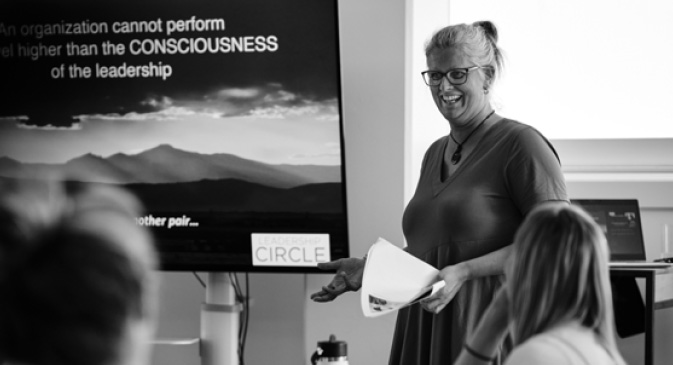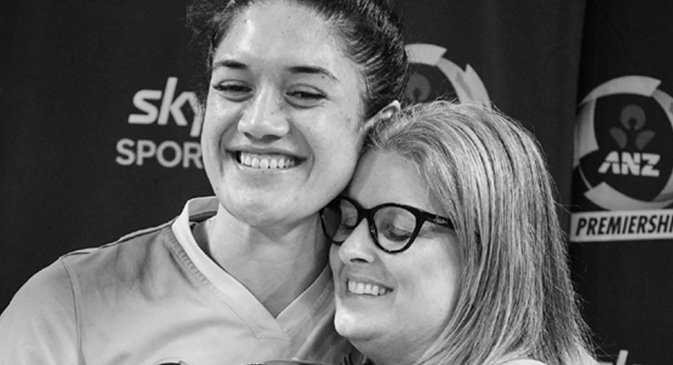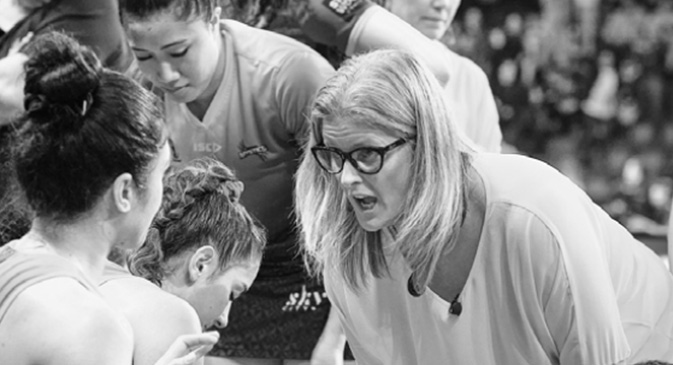Helene Wilson
Helene Wilson
- Coach Profile
- Netball
When you spend time with Helene Wilson, one thing is immediately clear – she cares greatly about helping people be the best they can be. That’s likely why she was pulled in the direction of teaching, coaching, and now a role that allows her to enable opportunities for women high performance coaches.
Wilson is Women in High Performance Sport Lead at HPSNZ, focused on attracting, developing, and retaining women in coaching and leadership roles. Two initiatives in place to enable this are Te Hāpaitanga, a holistic coach development programme, and the Residency Experience initiative, which creates opportunities for women to work in high performance environments as a leader. “Women can sometimes lack confidence to put their foot forward, so placement on a Residency Experience bridges that gap of development and real world high performance work experience,” Wilson says. “The goal is that when a woman gets to the recruitment table, she can’t be told she doesn’t have the experience.”
The dedicated strategy is proving fruitful. From the first two cohorts of Te Hāpaitanga women, 85% have had an increase in leadership responsibility within their sport.
Wilson believes these outcomes are indicators of a shift in the right direction. “Success for me is about having women around the leadership table during key discussions across all high performance sport contexts,” she says.

Wilson built a career in netball as a ‘pathways coach’. Through club, North Harbour representative level and New Zealand Secondary Schools teams, her coaching record and reputation grew, winning at each level. She then moved into coaching roles at Netball Northern and ANZ Premiership level and led the Northern Mystics to their first ever championship in 2021.
While winning is a definite highlight, Wilson isn’t in it for the trophies. “What I loved about coaching, and ultimately why I moved into high performance, is the challenge, not only for myself but the athletes,” she says. “You’re supporting people to reach potential they can’t necessarily see in themselves. You can shift their ability to perform, to step outside what they’ve done before. If you love doing that, you want to get better at it. That’s how I got to where I was as a coach.”
There’s also the knowledge that her involvement with the Mystics left an indelible mark. “It was more than preparing a team to win on that grand final day,” she reflects. “It was the succession planning and growth that was embedded into our processes. Everyone was encouraged to be themselves and step into the positions they needed to, and now, the Mystics are continuing to win without me there. I think that’s pretty cool, as it means what we did wasn’t about me. It was about the people who created that performance environment together.”
Decades of creating high performance environments has given Wilson a clear framework for what modern coaching looks like. “Historically, you had a head coach who was the expert and led everything, but high performance coaching is too complex to try and do it by yourself anymore” she says. “In modern coaching, the head coach is navigating the complexity utilising a team of experts and ensuring they are all adding value and being valued for their contribution. When they’re all coming together, you’ve got the whole basket full.”
As Mystics head coach, she saw strength in the coaching collective. “I’m a great connector, and my role was how we get alignment across the organisation, what’s important for performance and what’s not. I had the higher-level thinking and big picture principles for performance, but I used my experts to enhance performance. That’s when you get a winning formula.”
While a people-first philosophy is a strong value, Wilson is adamant about the main role of a coach. “In high performance, your job is to win, and to win, you need to be secure with the tension required to perform,” she says.

“There’s a risk of talking too much about all the other things going on in the environment, and not grounding ourselves in the fact we’re here to play the sport at the highest level possible. High performance sport brings together people from diverse backgrounds with the commonality of wanting to win. So the question is how do we perform in a way that includes all the people, and looks after them?”
That’s where the true art of coaching comes in. “Culture and wellbeing should be threaded through all the systems and processes you have in place to ensure performance,” Wilson says. “You’re only together as a group of people to try and get that performance. If you can thread the other aspects into your behaviours and habits, that’s the art. And to do that, you need a combination of people with different skillsets and lenses, who approach the performance together, willing to listen to understand, and outlearn their opposition.”
Her experiences as a coach led her to be part of Sport Performance Coaches NZ (SPCNZ). As HPSNZ explored athlete wellbeing, and the need for athletes to have an independent voice was discovered, the conversation turned to how best to support coaches. “Athletes and coaches are often in the performance arena together,” says Wilson, “and it’s healthy to have a space for coaches to connect.
Coaches are people first, too, and it’s important that we look after all our people in high performance.”
Wilson is encouraged by the avenues SPCNZ creates between coaches across sports, and the support during challenging times. Another positive she sees is the alignment across the sporting system. “Sport is maturing in the modern world,” she says. “It’s cool that coaches have come together, and that NSOs see the value in having this independent arm. Ultimately, the NSOs, athletes and coaches all want the same thing, to perform.”

SPCNZ will provide coaches the opportunity to share their experiences and knowledge, something Wilson has been doing with a range of trusted people throughout her coaching career. Netball visionaries such as Lyn Gunson, Dame Noeline Taurua, and Leigh Gibbs have always been on the end of the phone, providing Wilson with feedback, answers to questions, or listening to help her ensure she’s always learning and continuing to improve. They’re part of her wider team who supported her coaching journey. “If you try and do high performance coaching on your own, it’s a really lonely job. I hope that SPCNZ will give more coaches in New Zealand a support mechanism that’s independent, full of people who understand the challenges and context of being a performance coach.”
Seeking feedback in this way is the sign of a good coach. “A great coach doesn’t sit back and wait for the world to tap them on the shoulder,” she says. “They put their hand up, go forward and figure it out. High performance is about outlearning the opposition, and the opposition is always getting better, which means there’s always something to figure out. If you get knocked back, reframe, and address your gaps in order to get the goal you really want. That’s how you’ll get there.”
Wilson’s current role positions her perfectly to share this insight with the next generation of leading female coaches. “I can share my learnings and mistakes with the women I’m working with now,” she says. “That’s the gift that everybody who I have worked with, those who have been in my environments, has given to me. I’m sharing that so these women can learn and get better. That’s pretty cool.”